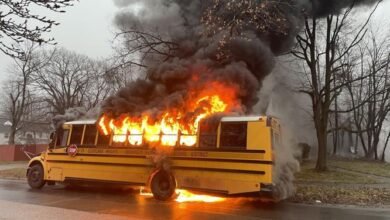From Handcuffs to Hall Passes: How Street Law is Redefining School Safety and Student Engagement in Ohio

COLUMBUS, OH, June 2025
At the 2025 Ohio School Safety Summit, one session stood out not for its policies or protocols, but for its deeply human core. Titled Street Law in Action, the session was led by Officer Dave McConnell of Northwest High School, a veteran law enforcement officer whose work is reframing what school safety truly means.
For Officer McConnell, safety is not about surveillance, it’s about connection. With over three decades of experience in law enforcement, including time as a juvenile correctional officer and detective specializing in sex crimes, McConnell now spends his days in classrooms, not cruisers. His current assignment as a School Resource Officer (SRO) includes co-teaching a unique, for-credit high school elective called Street Law.
“Being an SRO is the most fulfilling part of my career,” McConnell said. “You’re not just there to enforce. You’re there to listen, to teach, and to build trust.”
The Street Law program, now in its sixth year at Northwest High School, offers students, mostly juniors and seniors, a hands-on introduction to legal principles, criminal justice procedures, and real-world case studies. Co-taught daily alongside a social studies teacher, the class covers everything from constitutional rights and courtroom roles to interrogation techniques and forensic science.
But it’s not just textbooks and lectures. Every Friday, McConnell brings in guest speakers from across the justice ecosystem: prosecutors, defense attorneys, SWAT officers, forensic analysts, and even corrections officials. The result is a dynamic, immersive experience that allows students to engage with the real-life complexities of law and justice.
One particularly memorable moment, McConnell recalled, was when he brought in a retired narcotics K-9 unit for a live demonstration. “These kids lit up,” he said. “And not just because it was cool. They saw what law enforcement could be when it’s about service, not fear.”
McConnell’s storytelling was candid and personal. He spoke of his early skepticism about police, growing up in a working-class neighborhood where law enforcement was often viewed with suspicion. “It wasn’t until eighth grade that I met an officer who changed my perception,” he said. That encounter eventually inspired his career, and it’s the kind of transformational connection he now seeks to replicate with his students.
The impact of Street Law is already rippling beyond the classroom. Inspired by its success, Northwest High School has launched new electives like True Crime (led by the English Department) and Forensic Science (from the Science Department), and even math-based crash reconstruction modules. The school also hosts “signing days” where graduating seniors declare their career interests, many of which now include criminal justice, law, and public service.
“We’ve never seen this level of student engagement around civic careers before,” said one teacher. “It’s opened up entirely new pathways.”
The program isn’t without challenges. McConnell noted the care needed when sharing real-world case studies involving violence or trauma. But with parental consent forms, teacher collaboration, and a sensitivity to student maturity, the program manages to strike a balance between realism and responsibility.
Perhaps the most striking takeaway from the session was McConnell’s insistence that relationship-building, not authority, is the foundation of school safety.
“When a student warns you at midnight about a threat coming to school Monday morning, that’s not just vigilance, it’s trust,” he said, referencing a real incident where a student tipped off authorities and potentially prevented a tragedy.
As schools across the U.S. struggle with safety concerns, from mental health crises to active shooter threats, Street Law offers more than a curriculum. It offers a philosophy: that safety starts with being seen, heard, and valued.
“The kids don’t care how tough you are,” McConnell said. “They care if you’re real.”





